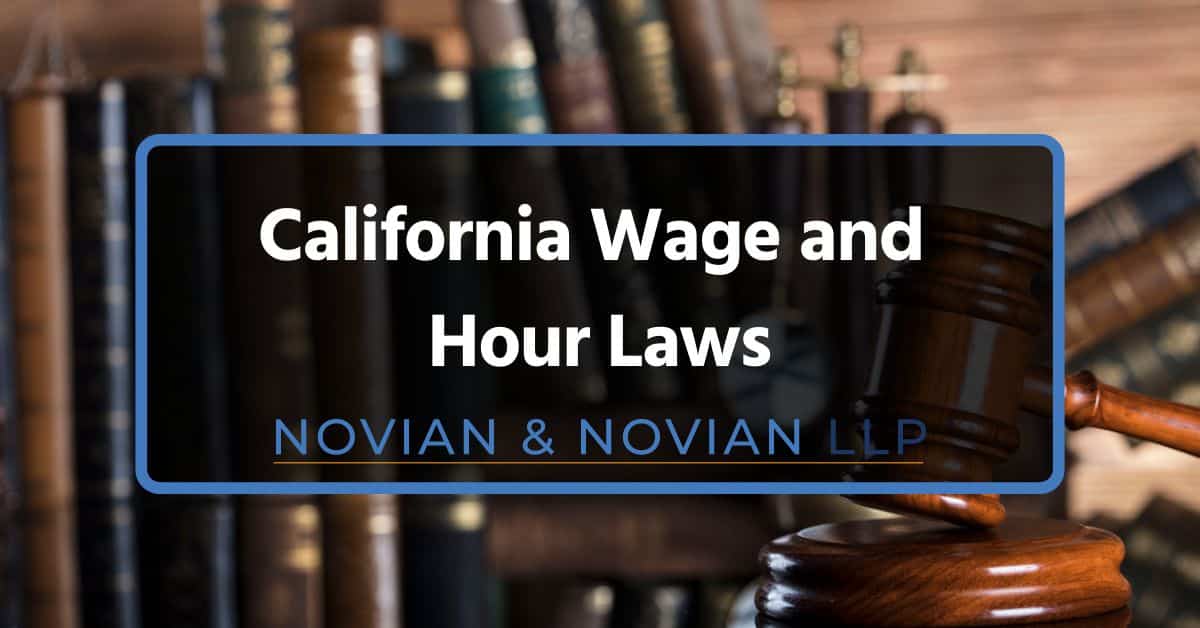
For employers in California, having an understanding of California’s wage and hour laws ensures compliance with state regulations. It also guarantees that you stay out of trouble with the law and have a productive workplace.
The spectrum of acceptable working hours and wages in California is governed by comprehensive statutes and regulations. For example, the state’s minimum wage is greater than the federal minimum in order to support a living wage for all workers and to account for the cost of living.
For employers seeking to navigate the complexities of wage and hour laws in California, Novian & Novian is here to offer expert guidance. With a focus on employment law and business litigation & dispute resolution, we help employers understand laws that help them comply with state regulations, resolve disputes, and implement the best practices in their employment policies.
Reach out to us today and let us help you navigate running your organization while staying compliant with employment laws!
This blog aims to ensure that employers are well informed about their responsibilities and the rights of their employees, especially as it applies to California wage and hour laws.
How Many Hours Can You Legally Work in California?
In California, wage and hour laws are defined by the California Labor Code. It sets the standards for minimum wage, overtime pay, rest breaks, etc. This ensures employees are fairly compensated.
California’s minimum wage is higher than the federal standard. Workers who put in more than eight hours a day or forty hours a week are required to get overtime compensation. For each additional hour worked, an employee receives 1.5 times their regular rate of pay. If they work more than 12 hours in a day or 8 hours on the seventh day in a work cycle, they receive double-time pay.
Meal and rest breaks are required by the Labor Code. For instance, 10-minute rest intervals for every four hours worked or a significant portion of them and 30-minute meal breaks for shifts longer than five hours (and a second break for works longer than ten hours). Companies that don’t follow these guidelines risk fines from the California Labor Commissioner or claims for unpaid wages under the Fair Labor Standards Act.
Wage and Hour Laws: Working Overtime in California
There isn’t a set restriction on how long a person can work in a day in California, but overtime regulations do apply. California’s lunch law mandates a 30-minute meal break for shifts over five hours, and a second break for shifts over 10 hours. Additionally, employees are entitled to 10-minute rest breaks for every four hours worked or a major fraction thereof.
Also, 12-hour shifts are legal in California. After 12 hours, employees must receive double time. California employers must adhere to California wage and hour laws, including overtime pay, rest breaks, and meal periods, to ensure employees are fairly compensated and to comply with the California Labor Code and standards enforced by the California Labor Commissioner’s Office.
California Wage and Hour Laws: Federal vs. State Laws
In California, state wage and hour laws often provide more protections for employees than federal laws, under the Fair Labor Standards Act (FLSA). When comparing the two, California laws typically offer a higher minimum wage, more stringent overtime pay requirements, and specific meal and rest break regulations that surpass federal standards.
Minimum Wage Laws
The current minimum wage rate in California is $16.00 per hour for all employers, regardless of the number of employees. These rates are higher than the federal minimum wage, which is $7.25 per hour.
California’s commitment to higher wage standards reflects its intent to adjust to the cost of living and economic conditions within the state.
Exceptions and Exemptions
Although most workers are entitled to the minimum wage, there are some exemptions and exceptions depending on particular industries, agreements, or job functions. For example, workers who spend more than half of their working time away from the employer’s place of business like outside salespeople may be exempt from minimum wage requirements. In addition, apprentices and learners may receive wage orders from the Industrial Welfare Commission, or a portion of the minimum wage as set forth by California law.
Students may work up to 20 hours a week at some employers (such as work-experience education programs) and get 85% of the California minimum wage. Under special circumstances, people with physical or mental disabilities may occasionally get less money than the minimum wage.
Penalties for Non-Compliance with Wage and Hour Laws
In California, employers who fail to comply with wage and hour laws face significant penalties, including fines, back wages, and damages. The average cost to defend an employment lawsuit varies based on different factors. Contact us now for a consultation!
In California, employers are to accurately track and give workers information about their hours worked during each pay period, salaries paid, including overtime, breaks for meals and rest, employee classification, and any applicable exemptions, etc. Employees also have a right to view their employment histories. Legally, employers must give these documents to anyone who asks for them. Then, employees will be able to confirm the authenticity of their pay and the legitimacy of their employer’s actions thanks to this transparency.
If California employees believe their wage and hour rights have been infringed upon, they may initially try resolving issues internally by talking to their company or the human resources department about their concerns. Sometimes, this results in misunderstandings or mistakes being quickly resolved.
Employees may also submit a claim with the Division of Labor Standards Enforcement (DLSE), generally known as the California Labor Commissioner’s Office if internal settlement is not possible. This entails filling out a claim form that lists all of the alleged infractions, including overtime concerns, missing meal and rest breaks, and unpaid earnings. The claim will be looked into by the DLSE, and it can entail a hearing when the employer and employee submit arguments and supporting documentation. After that, the DLSE makes a conclusion in light of the data.
Employees also have the option to file a lawsuit against their employer in court. Consulting with an employment lawyer like Novian & Novian can provide guidance on the best course of action based on the specifics of the case.
If an employer receives a notice of wage garnishment for an employee (e.g., for unpaid debts or child support), the employer is legally obligated to comply with the garnishment order. Employers must handle garnishments carefully to ensure compliance with both state and federal laws, avoiding illegal deductions from employees’ wages.
Consult our Employer Defense Attorneys in California
In this blog post, we explored California’s wage and hour laws, emphasizing their significance for both employers and employees. Understanding and complying with these regulations as a California employer is crucial for maintaining a lawful workplace.
If you’re seeking advice regarding wage and hour law compliance or any employment-related legal issues, our experienced attorneys at Novian & Novian are here to help. We provide legal support tailored to protect your business interests and navigate the complexities of employment law effectively.
Contact us today!
Contact Us
Have questions about this post? Novian & Novian is a full service law firm in Los Angeles with clients that span the country. Contact us today for a free consultation.
Contact Us
Have questions about this post? Novian & Novian is a full service law firm in Los Angeles with clients that span the country. Contact us today for a free consultation.


